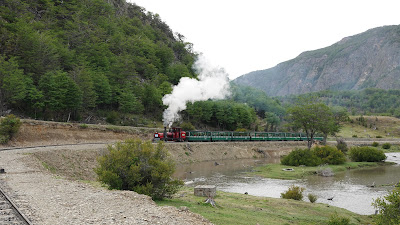Map of the island showing the Argentinian portion (Chile's on the left) and the Malvinas, which are the Falklands, which they apparently still think they own.
'Tren Del Fin Del Mundo', now a tourist destination, but originally built by convicts to transport wood they cut to heat the prison.
'End of the World Train'
Our guide Katya.
Upland goose.
The southern most continental post office.
What a place for a picnic!
Chimango caracara that tried to steal our lunch.
The beginning of the coastal hike that we did in the afternoon.
Spectacular views of the Andes.
Female Magellanic woodpecker.
And male.
Darwin fungus, or 'Indian bread' because the natives would eat the golfball sized pieces raw.
Beautiful forests.
Friday, November 15th.
Today was the first day of our
Patagonia tour that I booked at home through Signature Tours here in Argentina.
We were picked up by our guide Katya and the driver Martine for our tour of
Tierra Del Fuego National Park. There are only the two of us, which is quite
nice. The park is about a twenty-minute drive west of the city. As part of the
tour, we had tickets for the small gauge ‘End of the World Train’. In the late
1800’s Argentina tried to populate this area with convicts, the way Britain did
with Australia. They set up a prison colony and the prisoners were made to build
a train track into the forest to harvest wood to heat the prison. After the
prison was closed in 1947 the government decided to make the track into a
tourist attraction, and that it is. The trains are all new and the route is
only 7 kilometres but takes over an hour as top speed isn’t much faster than
walking. There were people dressed in convict stripes that tried to pose with
you for a picture you were meant to purchase later – you get the picture, very
touristy. When we got off the train Katya and Martine asked us what we thought
and weren’t surprised that we weren’t too impressed (and we said it kindly).
We drove into the national park and
went for a couple of half hour forest walks before having a sandwich picnic
lunch on the edge of a pretty lake, while a chimango caracara (a midsized
raptor) approached us on foot and tried to steal our food. Katya told us about
the major invasive mammal here, the beaver! 42 pairs were brought here in the
early 1900’s to try to start up a fur industry. Unfortunately, that didn’t work
out but the beavers bred well and since they have no predators here, they have
proliferated and are now a major pest. They are flooding areas and drowning
trees and as Martine said ‘live in beaver paradise’.
We were meant to go back to town
after lunch, but I mentioned to Katya about our frustrations yesterday and
inability to get to the park to do the coastal hike. She told us it would take
about three hours, so we asked if we could stay and do that. She agreed and we
said goodbye to Katya and Martine after they drove us to the beginning of the hike.
It was a long 8 km walk up and down hills through the forest and along the
coast, all of which was very beautiful. The forest is quite different from any
at home. There are lots of fallen trees, trees draped with old man’s whiskers
moss and great thickets of beech trees. By the end we were quite knackered but
really glad we did it. Then we had to wait about an hour for a local bus van to
take us back to town. The temperature had dropped and we were quite cool by the
time it came. The ride back in the milk run van took about an hour.
We had a short nap in the hotel
before heading out for our included dinner. We went to the Kuar Restaurant. We
had a pint of Beagle IPA and the restaurant said we could order anything from
the menu with our voucher. So, we ordered squid for an appetizer and sea bass
for the main. Shortly after they came back and said it was a fixed ‘tourist’
menu. So, we waited and had another pint of beer before they served us veal
parmigiana with fries. It wasn’t very good and definitely not sea bass. Oh well
the beer was good. Then we headed back for the night.















No comments:
Post a Comment